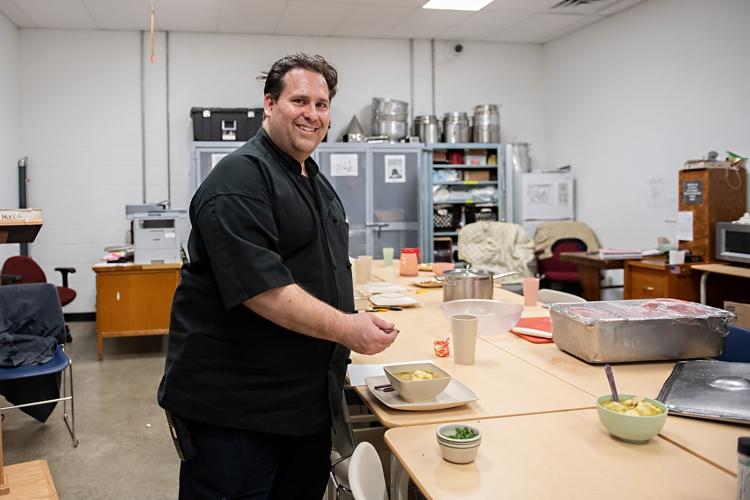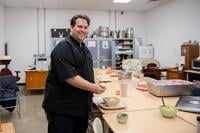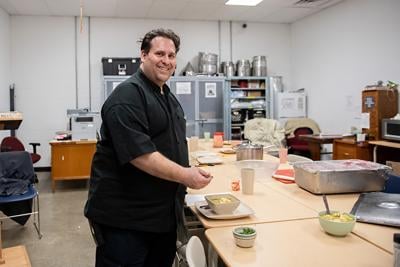This is the second in a three-part series on the offender reentry services at the Missouri Eastern Correctional Center.
To read part one, click here:
To read part three, click here:
The Missouri Eastern Correctional Center in Pacific has a tiny kitchen that looks like it could be in a swanky restaurant or five-star hotel.
On one November day, 10 men serving prison sentences crowd around the kitchen’s gas stove tops and sinks making all types of dumpling dishes.
The men can be heard shouting “behind!” and “hot plate!” as they make their way across the room. Head Chef Tony Nowicki tastes everything the men prepare and gives them honest feedback.
They are working to develop their culinary skills as part of the prison’s program designed to prepare them for their future.
MECC offers them opportunities to participate in non-paid vocational training, paid jobs through the Missouri Vocational Enterprises (MVE) program and develop workplace skills at the prison’s recently opened re-entry center.
The training opportunities help Missouri prisons reach the goals set by the Reentry 2030 national initiative, which the state became the first to join in April.
As part of the initiative, the Missouri Department of Corrections promises to provide career services for all people serving prison sentences, ensure that 85 percent of offenders are employed within 30 days of release and 80 percent maintain their employment for at least nine months. The state has until 2030 to reach these goals.
Vocational Supervisor Andy Robinson said the vocational programs’ goal is to provide men leaving prison with industry-recognized credentials they can put on their resumes.
“I had an offender tell me, ‘You want us to change, but you don’t have anything for us to change into.’ That became the focal point for my goals,” Robinson said. “We want them to change to societal norms, so let’s have them experience success because success will breed success.”
Learning to cook
Nowicki said the men in the culinary program start with little instruction, such as “make the broth” or “shape the dumplings,” as they each try to prepare the best dumpling-based food.
“They’ll be graded on a few different things: overall taste of the dish, texture and flavor of the dumplings,” Nowicki said. “Everything is made from their knowledge taken from the program. They had no instructions. It shows how far along these guys are coming.”

Kenneth Greer says the MECC’s culinary program has taught him how to properly handle food.
Kenneth Greer, 51, who graduated from Eureka High School, has served five years of a 15-year sentence he received for possession of a controlled substance and possession of a firearm. He said he always enjoyed cooking.
“I figured I could enhance my skills here,” he said. “In the past, I sold dope. This is my third time here. I’m about to be 52 in January, and I can’t go back here. I can’t do this again.”
Greer said he wants to open a barbecue food truck with his brother when he is released from prison. He said the culinary program has taught him the proper way to handle food.
“I’m learning how to layer flavors, how to cook meat correctly and how to cut the meat,” Greer said. “Mr. Nowicki is a very good teacher, and he has taught me immensely. (The culinary program) gives me the opportunity to use something I’ve learned when I leave.”
Factory training
Down a few doors from the kitchen is a large room filled with men hunched over sewing machines or cutting fabric on a long table. They are focused on churning out about 900 T-shirts a day for various Missouri prisons.
Vocational education teacher Linda Puff said the clothing factory has 45 workers and is one of the most coveted programs among those in prison.
“The (clothing factory) is an integral part of the re-entry services,” Institutional Reentry Coordinator Kenneth Korpecki said. “When they come here, they’ve got structure. They know they have to get up every day for work.”
The clothing factory is one of 22 industrial or service jobs offered through the MVE in 12 Missouri prisons. The products made in the prisons, which include office furniture, license plates and business cards, are sold to state and government agencies, government employees or non-profit agencies.
At MECC’s clothing factory, the men start producing shirts at 7:30 a.m. and finish at 3 p.m. Puff said some of the men working in the factory never had a real job before.
“I’ve had a lot of guys that, when they leave here, they say, ‘Oh my gosh, I could do this when I get on the streets,’” Puff said. “I tell them they can start at Amazon the day they leave prison. They’ve got the skills. They may not be sewing, but they understand how an assembly line works.”
The workers are paid 40 cents per hour when they first start at the factory. Puff said those in prison need to be violation-free for one year to be considered for the job. Within 90 days of starting, the men get a pay increase to 60 cents per hour.
Along with the men producing T-shirts, Puff said there are three clerk and three maintenance positions in the factory. Those jobs are the highest paying at 81 cents per hour.
Puff said the men may use the money to purchase goods in the prison, and they may send the funds to family members or friends.
Robert Woodard, 53, has been imprisoned since 2021 on first-degree child molestation charges. He was sentenced to 15 years.
Woodard works as a clerk at the factory, keeping the books and doing payroll.
“Yesterday, we sat down and put together an order for material,” he said. “We figure out what we need to cut, how much (material) we have on hand and how much we need to order.”
Woodard said he recently completed an administrative service management apprenticeship offered through the MVE program. He said the apprenticeship would bolster his resume.
Originally from Potosi, Woodard said he will go to St. Louis when he leaves prison in a little over two years.
“There are better job opportunities and better re-entry programs in St. Louis,” he said. “I’ll be staying out of trouble until then.”
Puff said she will do all she can to help the men find employment after they are released from prison.
“Everybody up here, I would hire them off the street if I were running a factory,” Puff said. “I don’t have any problem if they use me as a reference. They can call here or email me whenever.”
Korpecki said the vocational programs are all a combined effort to offer those in prison the skills and resume they need to stay out of prison in the future.
“Offenders need a hand-up, not a handout,” he said.











